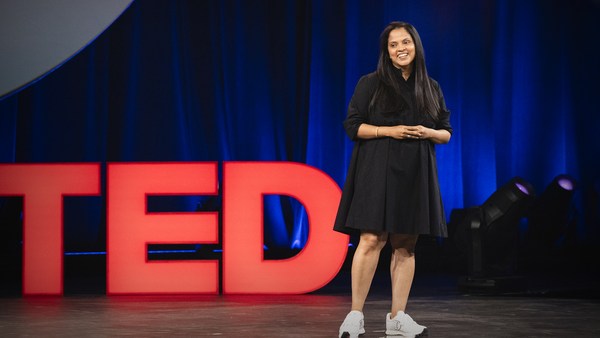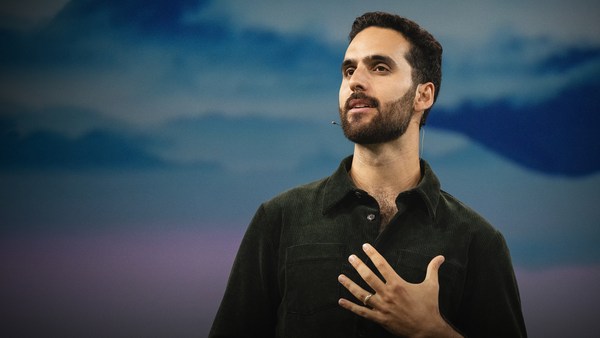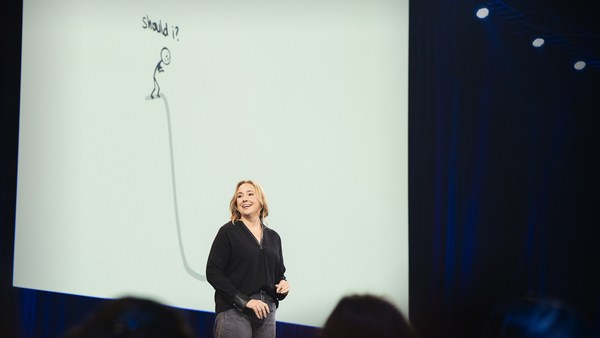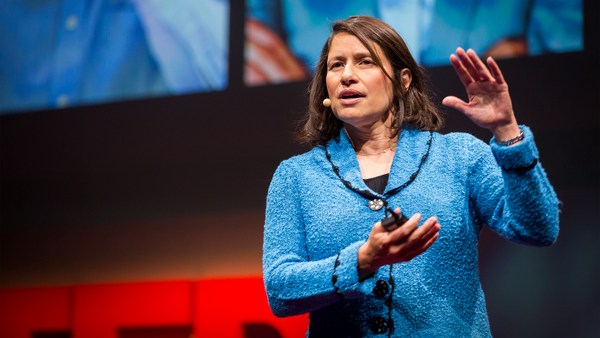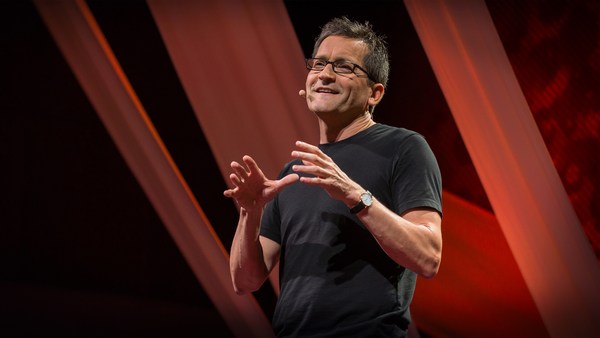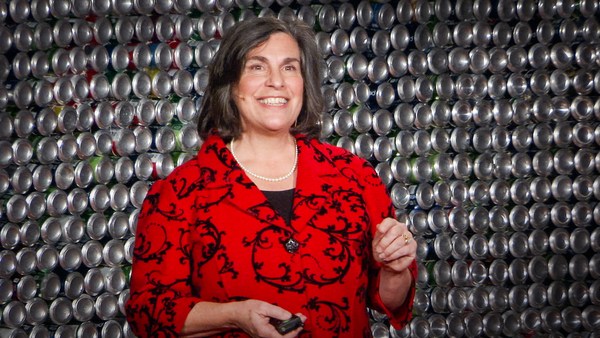Think back to your biggest setback. Not an obstacle, not a mistake. A setback is defined as a reversal or check in progress. It's when you're on a path, you're moving forward, and you are unexpectedly bumped backwards.
Through all my years as a journalist, I have interviewed hundreds of founders, business leaders, senators, celebrities, cultural icons. And in every interview, I saw a common theme. What they learned during their biggest setback led them to their most successful venture. I wanted to know why. Perhaps if I could learn from it, I could understand it, and I could help others work through their next inevitable setback and come out the other side with a sense of resilience, creativity, and hopefully success.
So I spent three years doing a deep dive into research, interviewing psychologists, executive coaches, a neuroscientist, reading academic papers, every business book I could get my hands on, all to come up with the framework now known as the Setback Cycle. I did all of this while holding down a full time job at a marketing agency. Who does that? A lot of people, actually. Turns out you don't make a lot of money writing books, so most of the authors you know and love are finding ways to earn an income elsewhere as well.
So at the end of that journey, I handed in my manuscript, I took a deep sigh of relief ... and I was laid off from that full time job 48 hours later.
(Laughter)
The setback expert finishes her work and is hit with one of the most common career setbacks. Oh, I loved that job. I loved the camaraderie, the stability, the fact that I was able to look toward my family's future. We had just bought a house. We were finally feeling comfortable, and then bam! The reversal in progress.
But through my disappointment, I began to see, like many of the people I had interviewed, my setback was a green light. You see, this wasn't my first professional setback. Five years earlier, I gave birth to my daughter, and when I returned from my very brief 12-week maternity leave, I expected everything to be just as I'd left it. To go right back into the role I had always taken so much pride in, with nothing disrupted at all. Every working parent will tell you that's a very unrealistic expectation. When I returned, I was told the people who replaced me had done such a good job. Didn't they deserve these opportunities now? Shouldn't they continue doing that work? Not temporarily, but indefinitely? I agreed, they had done a great job, and I had all the respect in the world for them, and I wanted them to have every opportunity to succeed. But where did that leave me? Wasn't I still deserving of opportunities in the workplace? There was no discussion of what else I might work on now that I had some availability.
Setbacks set the stage for reinvention. Your setback might look different than mine, but the cycle is the same. Because what happens when you sideline an ambitious person, an ambitious woman, a mother? She turns her energy and ambition elsewhere. It is not a coincidence that my journalism career skyrocketed the same year I had my daughter. More writing led to more visibility, more opportunities to speak on stages and being invited into more rooms where people started asking me, "Hey, would you ever consider doing marketing consulting on the side?" By the time I was laid off, I had already formed my LLC. I had a whole invoicing system, I had at least one client on retainer, and I was getting ready for the biggest professional milestone of my career, the launch of my book about how leaders successfully work through their biggest setbacks.
Setbacks set the stage for reinvention. But why? Why does this happen? Neuroscientist Chantel Prat told me that people who have gone through more setbacks are better at problem-solving, reasoning, logic. They're able to recognize the signs more quickly, and they can course correct more easily. When we experience a setback, our brains undergo a dopamine dip. We think of a dopamine dip as a negative thing. But dopamine is a plasticity inducer, which means it contributes to our mental flexibility and our resilience. It's kind of like exercising a muscle. You have to break down the muscle mass before it rebuilds its strength. You're sore, and then you're strong. It makes sense. When things are going well, we're not necessarily considering how we might improve, how we could do things better. But the aftermath of a setback is when we come up with our best ideas.
There are four phases of the Setback Cycle. The first phase is establish. Establishing you're in a setback, not as intuitive as one may think. Sure, some setbacks bonk you over the head. You fail a class, you're kicked out of school, a business investor pulls out, a relationship ends, you're fired from a job. Those are clear. But some of us float unconsciously into our own setbacks without even realizing it or because we choose to ignore it. How many people do you know who stayed in a relationship for too long or stayed in a job too long? Was that you? Is that maybe you right now?
I have something called the Alarm Clock Checklist, intended to wake you up if you think you might be floating, drifting into your own setback. In this exercise, I encourage you to ask yourself two questions. Number one, what are you energized by? Number two, what are you disengaged with? Write down your answers every day, every few days, over the course of a month. And at the end of that month, look back at your answers. See what patterns you can come up with. See what activities you had on certain days when you felt more energized or more disengaged. Some people do this exercise and find, yeah, I'm going to step back. But others do it and realize it's just the thing they needed to remind themselves of how engaged they still are in their work. It shows them they're exactly where they're meant to be.
Phase two of the Setback Cycle is embrace. This is the hardest phase because this piece requires us to get uncomfortable. And as a society, we have been conditioned to avoid discomfort. But remember, it's in those dopamine dips where the transformation happens. So we have to reframe our relationship with discomfort. I have a self-consciousness around intelligence. My intelligence has been questioned at times throughout my life. Let me assure you, though, I am very smart. I can say that confidently now. Critics have responded favorably to work I've put out into the world. I've won several industry awards. My book stayed on the "USA Today" bestseller list for several weeks in a row. But none of those accolades matter when I feel my intelligence or my credibility comes into question. This happens because I’m a woman, and I'm bubbly, and I smile a lot, and I chat a lot, and I'm talkative. And some people equate those characteristics with a lack of intelligence. Anyone else feel that? So when I was sidelined in my leadership role after maternity leave, that moment brought up all that self-consciousness that I always carry. I felt I had to prove my value again. That I needed to show everyone that I was still worthy of existing in the workforce. That any respect I had earned leading up to this moment was diminished, and I had to totally climb the mountain again. So many people leave the workforce for caregiving reasons. To care for a new child, to care for an elderly relative, to care for themselves. And my experience validated all the fear that caregivers have, thinking that the job won't be there when they get back, or it'll change, or they'll be penalized for prioritizing that care. Not only that, this moment wasn't just a hit to my career. It was a deep cut to my self-worth. See, the embrace phase is tough. If you create a narrative based on your biggest moments of self-doubt, you will find the proof to support it. But if you try, you can create a counterargument. How do you find the facts to support that counterargument, though? You turn to your community.
Phase three of the Setback Cycle is explore. The best thing you can do in the explore phase is cultivate your community. And if you think your community isn't that big, think again. Author and activist Susan McPherson wrote a book called "The Lost Art of Connecting." In it, she says, we are much more interconnected than we realize, and she equates our communities to constellations. And she says all it takes is one link to another star to unlock so many possibilities you may never have realized. You can start making those links by making connecting a habit. Every evening, when you sit down on your couch, take out your phone. Before you start scrolling, send a text message. Send a DM to someone you otherwise may not have reached out to. If you're feeling really ambitious, after this talk, go outside and make a phone call. I know, you're not a phone person, but I promise you this is going to be so much less awkward than you think it will be, and the benefits are immeasurable. How do you think I spent those first few weeks after getting laid off? I'm not a phone person either, but I was on the phone with everyone I knew: friends, old clients, former colleagues, every boss I ever had, saying, "Hey, I'm a little more available than I thought I'd be to do some marketing consulting." They were more than happy to make connections to everyone in their constellation. One person even congratulated me for being laid off. Sometimes it is your community who sees how amazing you are before even you do. Who see and know that your next chapter will be glorious. If you look over here, you will find the proof to support your self-doubt narrative. There will always be people who see you as the talkative, bubbly, smiley person and make assumptions about your intelligence because of that. But if you look over here, you see an entire universe, galaxies upon galaxies of people who have all the confidence in your capabilities. They see how bright you shine.
My community and the connections they made for me in the aftermath of my layoff is how I won my first few big contracts. It's how I was able to take that little side hustle and turn it into a thriving business, one that enabled me to start contributing to my family's expenses once again. Better yet, I was starting to reframe the narrative that I had any sort of lack of credibility or intelligence. There will always be people who make you feel like you need to prove your value. But if you listen to your community, if you listen to the good things people say about you, you will gain the confidence you need to move to the final phase of the Setback Cycle.
Phase four: emerge. Emerging from your setback is exhilarating. You have the tools. Now you need to decide what to build. But going from knowing to doing can be surprisingly complicated. Sometimes after all the introspection and the dopamine dips, and the strategizing, and the exploration, and the phone calls, you're a little exhausted. Sometimes you just need to rest. So take the rest. Give yourself the space you need before you propel yourself forward. Recognize any barriers you might still be facing and give yourself the grace to step around them. And when you're ready, move forward. Shed your cocoon. Spread your beautiful new wings. Your metamorphosis is complete.
I am rebelliously optimistic that after today, you will see setbacks so much more clearly, and you will emerge from them with a sense of all you can achieve. Remember that setback I asked you to think of at the beginning of this talk? Visualize it again. Now ask yourself, how did that setback set the stage for your reinvention?
Thank you.
(Applause)
